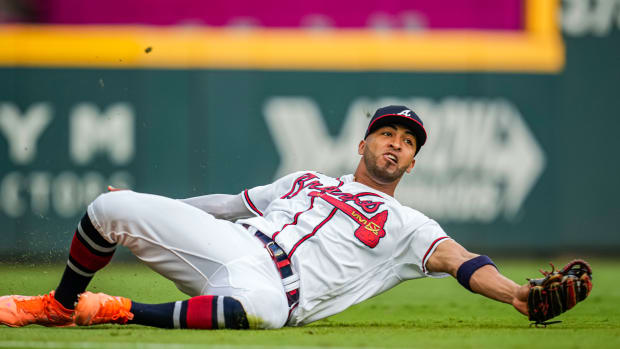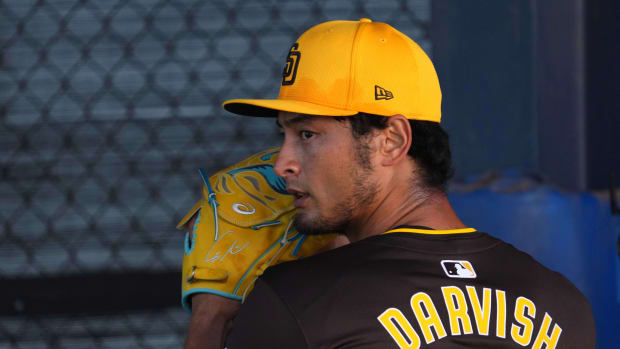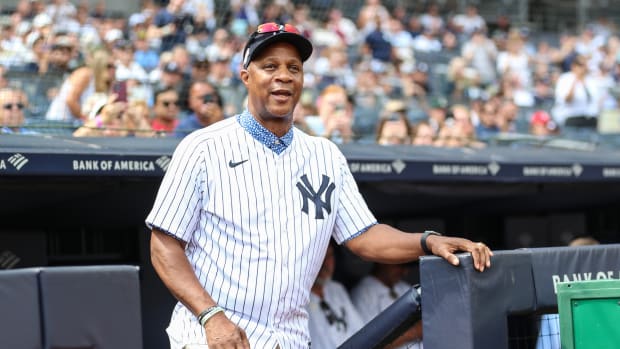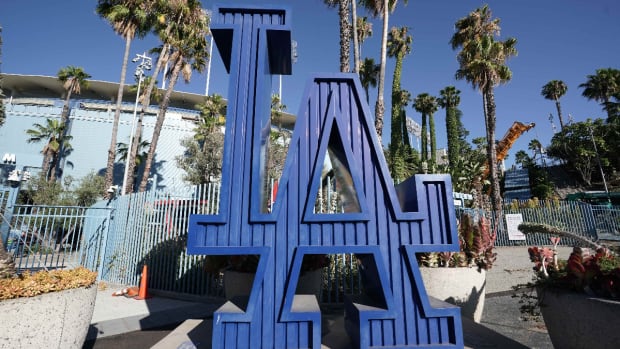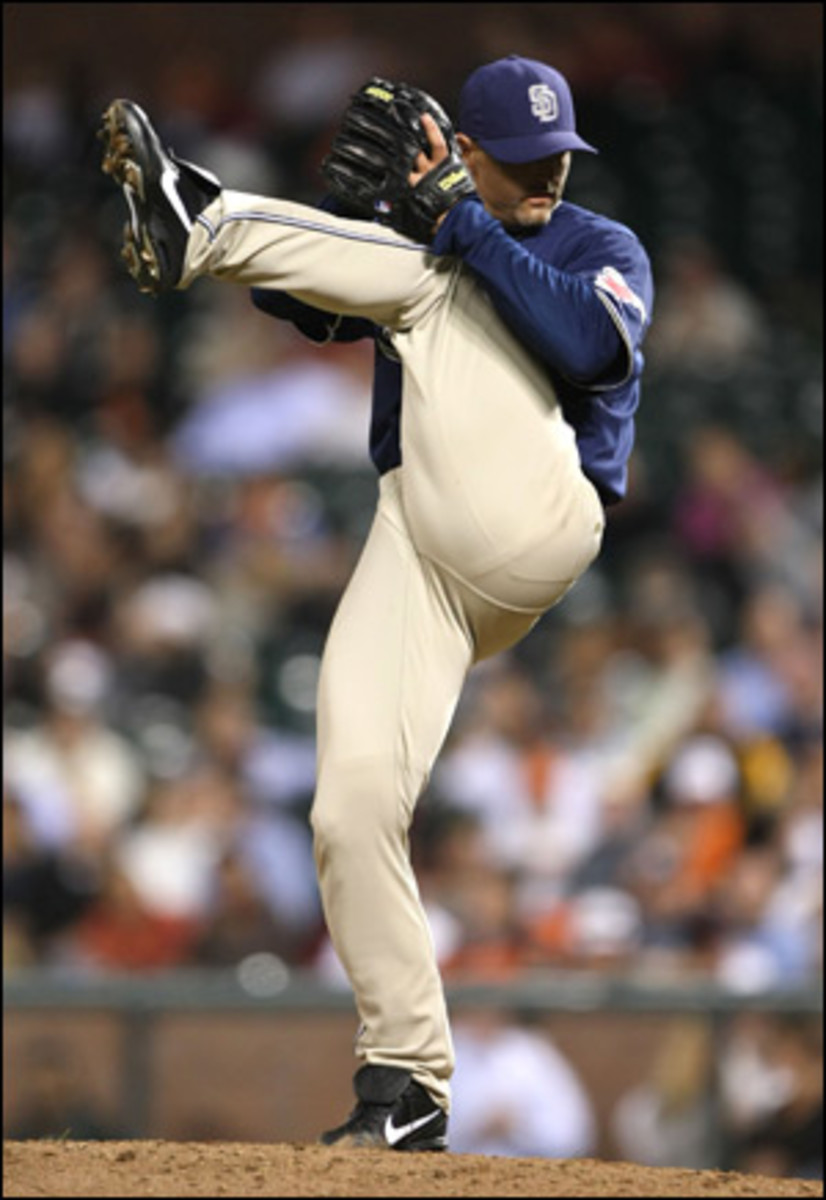
The Year in Sports 2007
On the morning after the nightmare, and three weeks before the wildfires would close in on him like the devil's breath, Trevor Hoffman awoke to the sound of children's laughter. The lilt in the voices of his three boys -- Brody, 11, Quinn, 10, and Wyatt, 8 -- felt soothing but like a balm over burns, which is to say that the sweetness only masked the pain.
It was a start, though.
Only two pitchers in baseball history know the terrible feeling of a walk-off loss in a winner-take-all tiebreaker game: Ralph Branca and Trevor Hoffman. On the first day of October, 56 years minus two days after Branca of the Dodgers threw the pitch that Bobby Thomson turned into The Shot Heard 'Round the World, the home run that won the 1951 NL pennant for the New York Giants, Hoffman, baseball's alltime saves leader, entrusted with an 8-6 lead over the Colorado Rockies in the bottom of the 13th inning, gave up three runs on just 19 pitches.
It was like watching a five-car pileup unfold on an icy freeway: double, double, triple, walk, sacrifice fly. Maybe the Rockies' Matt Holliday never did touch home plate with the winning run, but by then there was a move-it-along -there's-nothing-left-here -to-see feel to the proceedings. Colorado took the NL wild card, then advanced to its first World Series, winners, ultimately, of 21 of 22 games to get there.
The Padres went home.
"The finality of it..." Hoffman says. "There was no reward. If it happens in the playoffs, at least you were in the playoffs."
It was the second time in three days that Hoffman had let a playoff-clinching win get away. In Milwaukee two days before, he was one strike away from saving a 3-2 win that would have eliminated Colorado and put the Padres in the playoffs, another celebratory moment in a season full of them. Ace Jake Peavy was on his way to the pitching Triple Crown and Cy Young Award. Hoffman got his 500th career save. His former teammate and close friend, Tony Gwynn, had been inducted into the Hall of Fame.
That one strike Hoffman needed to put San Diego in the playoffs? Turned out he needed it against Tony Gwynn Jr., who as a boy would try to keep up with Hoffman during the pitcher's strenuous pregame workouts. Hoffman loved his company. The two played a game that Hoffman had made up: A trainer would loft a football while you were running sprints, and you'd have to run under it and catch it. Two points were awarded for a one-handed catch, one for a two-handed catch, nothing for a drop. "My hands were too small to catch one-handed," Tony Jr. says, "so I could never beat him."
As Gwynn stepped in with two outs and a runner at second, the Padres stood like sprinters in the starting blocks on the top of the steps of the visitors' dugout, ready to storm the field.
"I had never faced him," Gwynn says. "I didn't watch any film. I had a memory log from all the times I'd seen Trevor do his thing."
On a 2-2 pitch Hoffman threw his signature changeup, its fastball disguise a mystery to so many hitters over the last 15 years. Kept it low, too.
The kid pulled it into the rightfield corner for a triple. Game tied. He made sure not to make eye contact with Hoffman as he stood on third. He did peek into the Padres' dugout. "You could see there was a big letdown," he says. "Guys moving off the top step, like they were thinking, Oh, my God."
The Padres lost in 11 innings, 4-3. They fell the next day too, 11-6. Then the day after that, 9-8. Three games. Leads in every one of them, two of them in the hands of the best closer they've ever had. Where do you go from there?
Home is a good place to start.
Maybe 1% of all ballplayers become Hall of Famers, and only a few of those players become civic icons. Ernie Banks in Chicago, Al Kaline in Detroit, Cal Ripken in Baltimore. Hoffman, a longtime resident of Rancho Sante Fe in San Diego County, belongs in that group.
A supporter of the National Kidney Foundation, Hoffman -- who lost a kidney as an infant -- meets "Kidney Kids" before every Saturday home game. The son and son-in-law of military servicemen, Hoffman regularly buys tickets for Marine families, many with a parent deployed overseas.
"Trevor is San Diego," says G.M. Kevin Towers. "He's our Tony Gwynn now."
Hoffman didn't venture out much after the loss to the Rockies. "But then," he says, "complete strangers were coming up to me and supporting me. I went to the grocery store, and people were going, 'I just wanted to tell you that you had a great year. Keep your head up.' It happened over and over.
"See, being in San Diego all these years and being a professional ballplayer, I've always been the one to get out there and encourage people to work hard and stay positive. And now for that to come back to me.... It was heartwarming. It blew me away."
Tom Gregory, his high school basketball coach, gave him an autographed picture from his own mentor. "To Trevor Hoffman," it reads. "The true strength of a person's character is the manner in which they react to victory and defeat. Sincerely, John Wooden."
The clouds began to lift.
Then at 6:30 on the morning of Oct. 22 the phone rang. It was a reverse 911 call with an urgent message: Get out of the house now. Wildfires that would eventually destroy about 500,000 acres and some 1,500 homes in Southern California were heading across a canyon for his neighborhood. There was no time to wait, not with the fire stoked by winds gusting up to 90 miles per hour. Hoffman, his wife and their boys began driving north to stay with family in Orange County.
A home up the street was damaged, but most of the homes, including the Hoffmans', were left unscathed thanks to emergency work by a strike force of firefighters. "We were lucky," Hoffman said.
What would you do if you had to leave your home immediately, not knowing if it would still be there when you came back? What would you take with you?
Hoffman grabbed some family photographs off the walls. Videos of the kids. That was it. "No memorabilia," he said. "No baseball things.
"I know this: Baseball is important, but that is not who you are. Your true identity is found in what kind of dad and husband and friend you are." -- Tom Verducci
They hated him. Really, they did. Still, they couldn't help themselves. For Dodgers fans the only thing worse than seeing Barry Bonds break the home run record in L.A. was seeing him not do it.
The great villain from the north arrived on Tuesday, July 31, stuck on 754, and all of L.A. fought to be the first to tell him he sucked. Anyone who knew anyone was begging for a ticket, and those who succeeded broke SoCal protocol by trying to arrive on time. It was mayhem. Traffic stalled outside Chavez Ravine, choppers flying overhead, fashionable women hurrying unfashionably to make it before the first Barry at bat.
Of course they berated Bonds, but they also rooted for him -- or at least for what he might do. Each time the Giants slugger came to the plate, entire sections rose to their feet for the biggest, most lucrative game of Three Flies Up in history. Hell, mortgages were in the balance; there were start-ups to be started up. Considering the estimated selling price of $50,000 for number 755 (the record-tying homer) and $500,000 for 756, there were plenty of reasons to urge on Bonds.
Down the leftfield line Anthony Ellis was assigned to Track Seven in the grid, unofficially known as the Bonds Watch. The security guard stood at attention, thick arms crossed over white polo shirt, dark head shaved and straddled by a headset. If Bonds hit a homer, there'd be no kids sprinting onto the field, as happened with Hank Aaron. "Someone does that," said Ellis, a former bodybuilder who, at age 50, leg presses 700 pounds in sets of 25, "and he won't make it five feet before we cream the dude. No one's getting to Barry on my watch."
And Barry? He tried to act like it was just another day at the park. "The only thing that bothers you is when your little kids are around and you've got adults acting like children," he said. Perhaps he was referring to the man in blackface in the Bonds jersey?
In the end they all waited. Only there weren't many swings. No one wanted to be on the mound for history. So Bonds watched the balls pile up, and as he did, the Dodgers fans turned on their own. They booed reliever Jonathan Broxton when he issued an intentional walk to Bonds. They hissed at starter Mark Hendrickson when he didn't serve up meatballs.
It came down to the final game of the series on Aug. 2. True to form, Dodgers righty Brett Tomko was erratic, allowing three runs in the first, but Bonds could find no purchase on his fastballs, finishing with two walks and a single before being pulled in the seventh for a pinch runner. With Bonds's exit, L.A. evacuated the Ravine. There was traffic to beat, and they'd seen Barry. And that's what this was about: seeing Barry. Which made it a peculiar phenomenon indeed. For perhaps the first time in this long, bitter rivalry, Dodgers fans wanted nothing more than to see a Giant succeed. -- Chris Ballard
Texas Rangers third baseman Travis Metcalf had gone to sleep on the night of Aug. 21 as a member of the Triple A Oklahoma RedHawks but caught a 6 a.m. flight from New Orleans to Baltimore the following morning, after he learned that the Rangers had recalled him. By the eighth inning of that day's twi-night doubleheader against the Orioles, he was circling the bases, having slugged a pinch-hit grand slam -- only his second big league homer. "It was surreal," he says. "Everyone kept looking at each other like, Is this really happening?"
None of the four Orioles pitchers that afternoon allowed fewer than six earned runs or fewer than eight base runners in a 30-3 Rangers win, the most lopsided in baseball's modern era. The offensive explosion got so out of hand that manager Ron Washington instructed third base coach Don Wakamatsu to send runners around only if they could score standing up. "You don't want to seem like you're trying to bury a team," says Washington.
"It didn't work."
Leo Mazzone, who oversaw some of baseball's finest rotations for 15 years with the Atlanta Braves but was fired in October after just two seasons in Baltimore, believes that the Orioles felt the effects of the beating long afterward. Baltimore (which, incidentally, had named Dave Trembley its permanent skipper earlier in the day) went on to drop their next eight games and won only 11 of their remaining 37. "When somebody says, 'It's just one loss, regardless of the score' -- that's b.s.," says Mazzone. "There was a tremendous carryover. You get so rocked and so bombed that you go, Holy mackerel. It's downright embarrassing, to be honest." -- Ben Reiter































